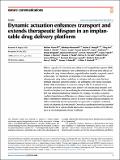Dynamic actuation enhances transport and extends therapeutic lifespan in an implantable drug delivery platform
Author(s)
Whyte, William; Goswami, Debkalpa; Wang, Sophie X.; Fan, Yiling; Ward, Niamh A.; Levey, Ruth E.; Beatty, Rachel; Robinson, Scott T.; Sheppard, Declan; O’Connor, Raymond; Monahan, David S.; Trask, Lesley; Mendez, Keegan L.; Varela, Claudia E.; Horvath, Markus A.; Wylie, Robert; O’Dwyer, Joanne; Domingo-Lopez, Daniel A.; Rothman, Arielle S.; Duffy, Garry P.; Dolan, Eimear B.; Roche, Ellen T.; ... Show more Show less
Downloads41467-022-32147-w.pdf (2.651Mb)
Publisher with Creative Commons License
Publisher with Creative Commons License
Creative Commons Attribution
Terms of use
Metadata
Show full item recordAbstract
Fibrous capsule (FC) formation, secondary to the foreign body response (FBR), impedes molecular transport and is detrimental to the long-term efficacy of implantable drug delivery devices, especially when tunable, temporal control is necessary. We report the development of an implantable mechanotherapeutic drug delivery platform to mitigate and overcome this host immune response using two distinct, yet synergistic soft robotic strategies. Firstly, daily intermittent actuation (cycling at 1 Hz for 5 minutes every 12 hours) preserves long-term, rapid delivery of a model drug (insulin) over 8 weeks of implantation, by mediating local immunomodulation of the cellular FBR and inducing multiphasic temporal FC changes. Secondly, actuation-mediated rapid release of therapy can enhance mass transport and therapeutic effect with tunable, temporal control. In a step towards clinical translation, we utilise a minimally invasive percutaneous approach to implant a scaled-up device in a human cadaveric model. Our soft actuatable platform has potential clinical utility for a variety of indications where transport is affected by fibrosis, such as the management of type 1 diabetes.
Date issued
2022-08-03Department
Massachusetts Institute of Technology. Institute for Medical Engineering & Science; Massachusetts Institute of Technology. Department of Mechanical Engineering; Harvard University--MIT Division of Health Sciences and TechnologyJournal
Nature Communications
Publisher
Springer Science and Business Media LLC
Citation
Whyte, W., Goswami, D., Wang, S.X. et al. Dynamic actuation enhances transport and extends therapeutic lifespan in an implantable drug delivery platform. Nat Commun 13, 4496 (2022).
Version: Final published version
ISSN
2041-1723
Keywords
General Physics and Astronomy, General Biochemistry, Genetics and Molecular Biology, General Chemistry, Multidisciplinary